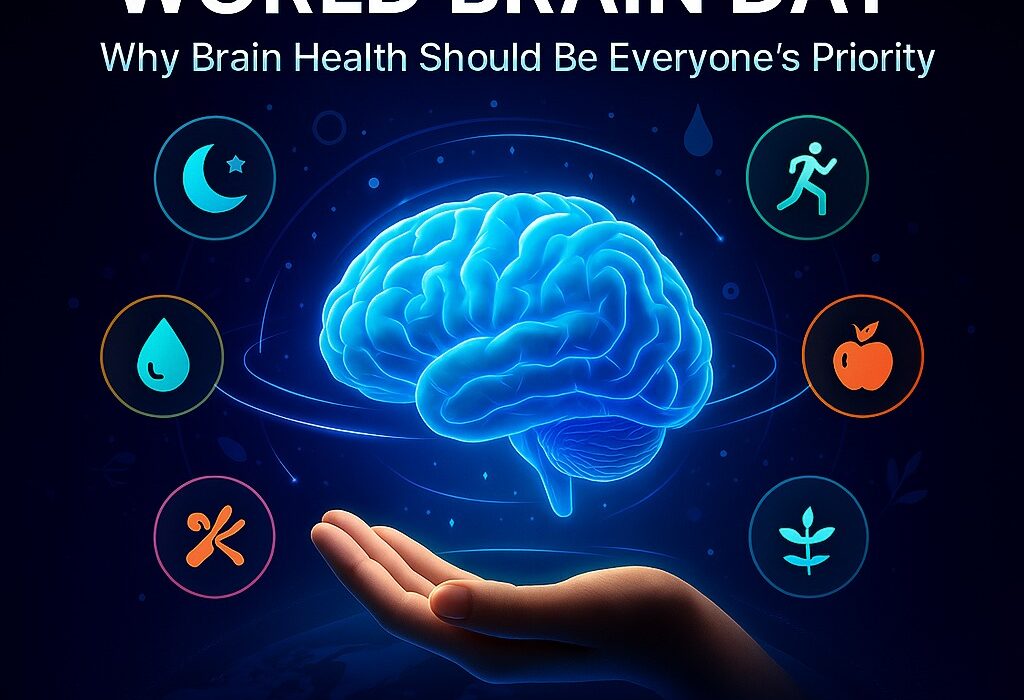Unlock the power of your mind—why caring for your brain is the smartest move you’ll ever make:
Every year, July 22 is observed as World Brain Day, a global initiative launched by the World Federation of Neurology (WFN) to raise awareness about brain health and neurological disorders. The theme for each year highlights a particular area of concern—from migraine and Parkinson’s to multiple sclerosis and brain disabilities—but the underlying message remains consistent: Brain health must be a priority for all.
In today’s fast-paced, stress-driven world, we often pay attention to our physical appearance, fitness levels, and nutritional intake. Yet, one organ that quietly controls every movement, decision, emotion, and memory—the brain—is frequently overlooked until something goes wrong. World Brain Day urges us to change that.
The Brain: Our Command Center
The brain is a complex network of neurons and systems that controls everything—from our ability to speak and move to how we think, feel, and remember. It governs not only physical function but also emotional balance, personality, and decision-making. A healthy brain is essential for:
- Learning and memory
- Problem-solving and focus
- Mood and mental health
- Coordination and movement
- Autonomy in daily living
Given the brain’s central role, its health directly affects the quality of our lives. When the brain thrives, we thrive.
What Is Brain Health?
Brain health is a broad concept that refers to the preservation of optimal brain integrity and mental and cognitive function at a given age. It includes:
- Cognitive health: Your ability to think, learn, and remember.
- Motor function: Your ability to control movement and balance.
- Emotional function: Your ability to interpret and respond to emotions.
- Tactile function: How your brain processes sensations like pain, pressure, and temperature.
Good brain health allows individuals to lead independent, productive lives. Conversely, when brain health deteriorates, it affects not just the individual but also families, healthcare systems, and economies.
Investing in brain health from early life through adulthood has been shown to yield substantial social and economic benefits. Improved brain function enhances cognitive development, leading to increased school retention and better academic achievement. These educational gains form the bedrock of a skilled and competent workforce. Furthermore, evidence suggests that good brain health is associated with lower rates of teenage pregnancies and reduced incidences of incarceration—two major societal challenges that can have long-term consequences for individuals and communities alike.
On Mind Body Willness Day: Simple Practices to Enhance Your Mind-Body Wellness on International Day
Moreover, from an economic perspective, optimizing brain health can significantly reduce the burden on healthcare systems by lowering rates of chronic mental and neurological disorders, decreasing disability claims, and minimizing long-term care costs. At the same time, healthier brains translate to higher productivity, improved work performance, and greater economic output. Societies that prioritize brain health often experience increased prosperity, reduced poverty, and a better quality of life for their populations.
The Global Burden of Neurological Disorders:
Neurological conditions are increasing at an alarming rate. According to the World Health Organization (WHO):
- Neurological disorders are the leading cause of disability-adjusted life years (DALYs).
- They are the second leading cause of death globally, with stroke and Alzheimer’s disease topping the list.
- Conditions like migraine, epilepsy, dementia, Parkinson’s disease, multiple sclerosis, and neuro infections (such as meningitis and encephalitis) are rising steadily.
Despite the burden, there is limited public awareness and often a significant stigma associated with neurological and mental health conditions. This results in delayed diagnosis, insufficient treatment, and reduced quality of life for patients.
Why Brain Health Should Be a Universal Priority:
Brain health is essential to every aspect of our life—from the ability to work and build relationships to making decisions and enjoying hobbies. Here’s why everyone should prioritize brain health:
- It Affects Every Stage of Life:
Brain development starts in the womb and continues well into the 20s. However, brain health doesn’t stop being important after childhood or adolescence—it requires lifelong maintenance, especially as risks of stroke, dementia, and degenerative diseases increase with age.
- It Influences Productivity and Mental Clarity:
Your brain processes thousands of signals daily. Good brain health translates to sharper focus, better memory, creativity, and effective communication—crucial traits in both personal and professional life.
- It Determines Emotional and Social Well-being:
Our mood, decision-making, empathy, and resilience depend on how well our brain functions. Emotional intelligence, often rooted in neurological health, affects the way we connect with others.
- It Can Help Prevent or Delay Diseases:
A healthy brain is more resilient against neurodegenerative conditions. Preventative measures taken early—such as physical activity, stress management, and healthy sleep—can delay or reduce the impact of Alzheimer’s, Parkinson’s, and more.
MEN’S HEALTH MATTERS: WHAT EVERY MAN SHOULD CHECK BEFORE TURNING 40
Everyday Habits That Promote Brain Health:
Maintaining good brain health doesn’t require complicated steps. Here are scientifically backed lifestyle habits to keep your brain in top shape:
- Stay Physically Active:
Exercise boosts blood flow to the brain, encourages neurogenesis (creation of new brain cells), and improves mood. Activities like walking, swimming, yoga, and dancing have shown cognitive benefits.
- Eat a Brain-Healthy Diet:
Diets rich in omega-3 fatty acids, antioxidants, and plant-based foods (such as the Mediterranean or MIND diet) have been linked with lower risks of cognitive decline. Avoid excessive sugar and processed food.
- Prioritize Sleep:
Sleep is vital for memory consolidation, toxin removal, and emotional regulation. Aim for 7–9 hours of quality sleep daily.
- Engage in Mental Exercise:
Just like the body, the brain needs regular training. Reading, puzzles, learning a new language or instrument, and even playing strategy games can help keep your brain agile.
- Nurture Social Connections:
Humans are social creatures, and positive relationships help combat depression and cognitive decline. Regular conversations, shared activities, and emotional support go a long way in keeping your mind healthy.
- Manage Stress
Chronic stress releases cortisol, which over time can damage the brain and impair memory. Techniques such as mindfulness meditation, breathing exercises, and therapy are effective in reducing stress levels.
Recognizing Brain-Related Red Flags:
Early detection is key. Here are some signs that could indicate a potential neurological issue:
- Frequent memory lapses or confusion
- Difficulty speaking or understanding speech
- Sudden changes in behavior or personality
- Persistent headaches, dizziness, or seizures
- Loss of coordination or motor control
If you or someone you know experiences these symptoms, it’s important to consult a neurologist or healthcare provider.
The Need for Advocacy and Equity:
One of the major themes of World Brain Day is health equity. In many parts of the world, especially low- and middle-income countries, access to neurologists, MRI scanners, and treatments is limited. Awareness campaigns must also break the social stigma around brain-related diseases, especially mental health.
Governments, healthcare systems, and civil society must collaborate to:
- Train more healthcare professionals in neurology and psychiatry
- Increase funding for research and early diagnosis
- Make neurorehabilitation and mental health services accessible and affordable
- Educate the public to reduce fear and ignorance around brain disorders
This World Brain Day, Make a Difference:
Here are some ways you can contribute to the cause:
- Educate yourself and others about brain health and neurological conditions.
- Support brain-related charities or awareness campaigns.
- Practice a brain-healthy habit—start today with a walk, puzzle, or digital detox.
- Advocate for change in your community or workplace regarding mental health and cognitive wellness.
To sum it up, optimizing brain health for all is not just a healthcare goal—it is a global priority. It underpins human development and is essential for achieving the broader objectives of public health, economic growth, and sustainable development. As we strive for a more equitable and prosperous world, brain health must be recognized and promoted as a vital component of global well-being.
CONCLUSION:
Your brain defines your identity—it stores your thoughts, memories, beliefs, and dreams. It controls your movements, decisions, and emotions. In essence, your brain is you.
This World Brain Day, take a moment to acknowledge the power and fragility of this remarkable organ. Let’s shift the global conversation to prioritize brain health—not just for patients, but for everyone, at every age. Because when the brain thrives, humanity thrives.






